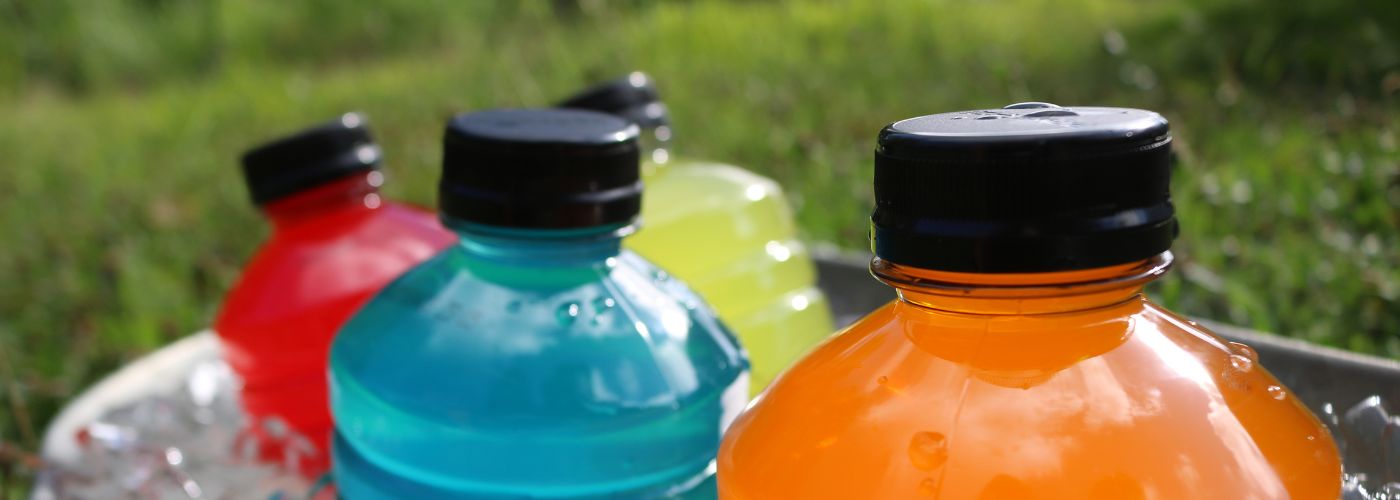Sports drinks have become a common sight on the shelves of grocery stores, and they are often marketed as the ultimate solution to stay hydrated and energized during physical activities. But do sports drinks really live up to the hype?
Let’s explore whether these drinks are good for you, examine their pros and cons, compare them to energy drinks, and help you determine when it’s best to reach for a sports drink instead of water!
Are Sports Drinks Good For You?

Like TENS/EMS devices and other equipment and supplements, sports drinks are ideally meant to help facilitate recovery after a workout. They’re designed to replenish the electrolytes and fluids lost during intense physical activity.
These drinks typically contain a combination of water, sugars, electrolytes like sodium and potassium, and sometimes vitamins. While they can serve a purpose for certain individuals, they may not be necessary or ideal for everyone.
Pros And Cons Of Sports Drinks

As with creatine, protein powder, or any supplement, it’s important to be aware of both the pros and cons. Let’s take a look at the upsides and downsides of many sports drinks:
Pros of Sports Drinks:
Hydration: These drinks can be effective at rehydrating your body during and after prolonged physical exertion, helping to replace lost fluids and electrolytes.
Energy Boost: The sugars in these beverages can provide a quick source of energy, especially during endurance activities like cycling exercises when your glycogen stores are depleted.
Taste: Many people find these drinks more palatable than plain water, making it easier to stay hydrated during strenuous workouts.
Cons of Sports Drinks:
Calories and Sugar: These beverages can be high in calories and sugar, which may not be suitable for those trying to maintain or lose weight.
Acidic Content: Some brands can be acidic, which can be harsh on your teeth enamel if consumed frequently.
Not for Everyday Use: For most individuals engaging in regular moderate exercise, plain water is usually sufficient for hydration. Sports drinks are often best reserved for high-intensity or prolonged activities.
Sports Drinks vs Energy Drinks
Sports drinks and energy drinks are often confused, but they serve different purposes and have distinct ingredients.
Sports Drinks:
- Designed to rehydrate and replenish electrolytes.
- Typically contain sugars, electrolytes, and water.
- Aimed at athletes and individuals engaging in vigorous physical activity.
Energy Drinks:
- Intended to boost energy and alertness.
- Often contain caffeine, taurine, B-vitamins, and sugars.
- Targeted at people seeking a quick energy boost, but not necessarily tied to physical activity.
It’s essential to choose the right beverage based on your needs. If you’re looking for hydration during or after exercise, opt for a sports drink. If you need a quick energy boost and mental alertness, an energy drink might be more appropriate, although they come with their own set of concerns, especially regarding excessive caffeine intake.
When You Should Utilize A Sports Drink vs Water
Determining when to use a sports drink versus water largely depends on your activity level and the duration of your exercise.
When to Choose a Sports Drink:
Long-Distance Running or Cycling: For activities lasting over an hour, these drinks can help maintain electrolyte balance and provide energy.
High-Intensity Workouts: If you’re sweating profusely during high-intensity interval training (HIIT) sessions, these drinks can help replace lost fluids and electrolytes.
Hot and Humid Conditions: In hot weather, you’ll sweat more, and these drinks can be beneficial to prevent dehydration.
When to Stick with Water:
Short Workouts: For workouts lasting less than an hour, water is generally sufficient to keep you hydrated.
Casual Exercise: If you’re doing light to moderate physical activity, water should be your go-to choice.
Weight Management: If you’re watching your calorie intake, opt for water to avoid unnecessary sugar and calories.
Sports drinks can be a valuable tool for athletes and those engaged in high-intensity, prolonged activities. They help replace lost fluids and provide a quick energy source. However, for most people, especially those engaging in moderate exercise, water remains the best choice for staying hydrated. Remember that moderation is key when it comes to sports drinks, and always read the labels to understand their sugar and calorie content. Make an informed choice based on your individual needs and activity level to ensure you’re getting the most out of your hydration strategy.

Related Stories
Red, White, and Soothe: How HiDow Helps You Recover in the Heat
Recovery that works in winter doesn’t always hold up in the heat. The body reacts...
Jul
Massage Gun Showdown: How the Power Duo Compares to Traditional Methods
Have you ever considered that a handheld device could revolutionize your muscle recovery? With the...
Jun
Fatherly Fitness Tips For Men’s Health Month
Men’s Health Month is more than a date on the calendar—it’s a call to action....
Jun
Built to Move: The Everyday Recovery Edit
Movement is what keeps us going—literally. Whether it’s recovering after a run, loosening up after...
Jun
Unlocking The Secret To Tissue Injury Recovery With TENS/EMS Devices
Have you ever wondered why some injuries take longer to heal than others? Tissue injuries...
May
Get Mobile With HiDow TriggerFlex Tools & TriggerFlex 2.0
Tight muscles holding you back? Whether you’re dealing with daily tension or post-workout soreness, recovery...
May